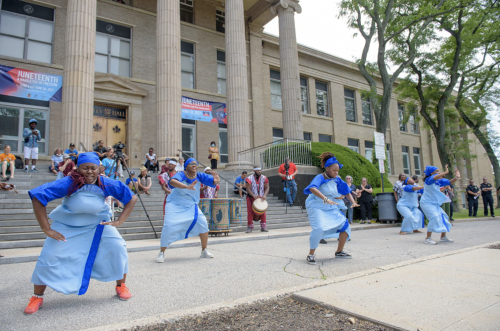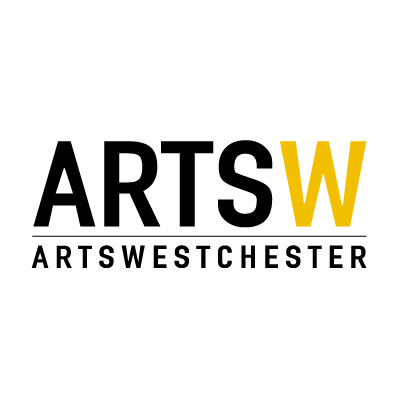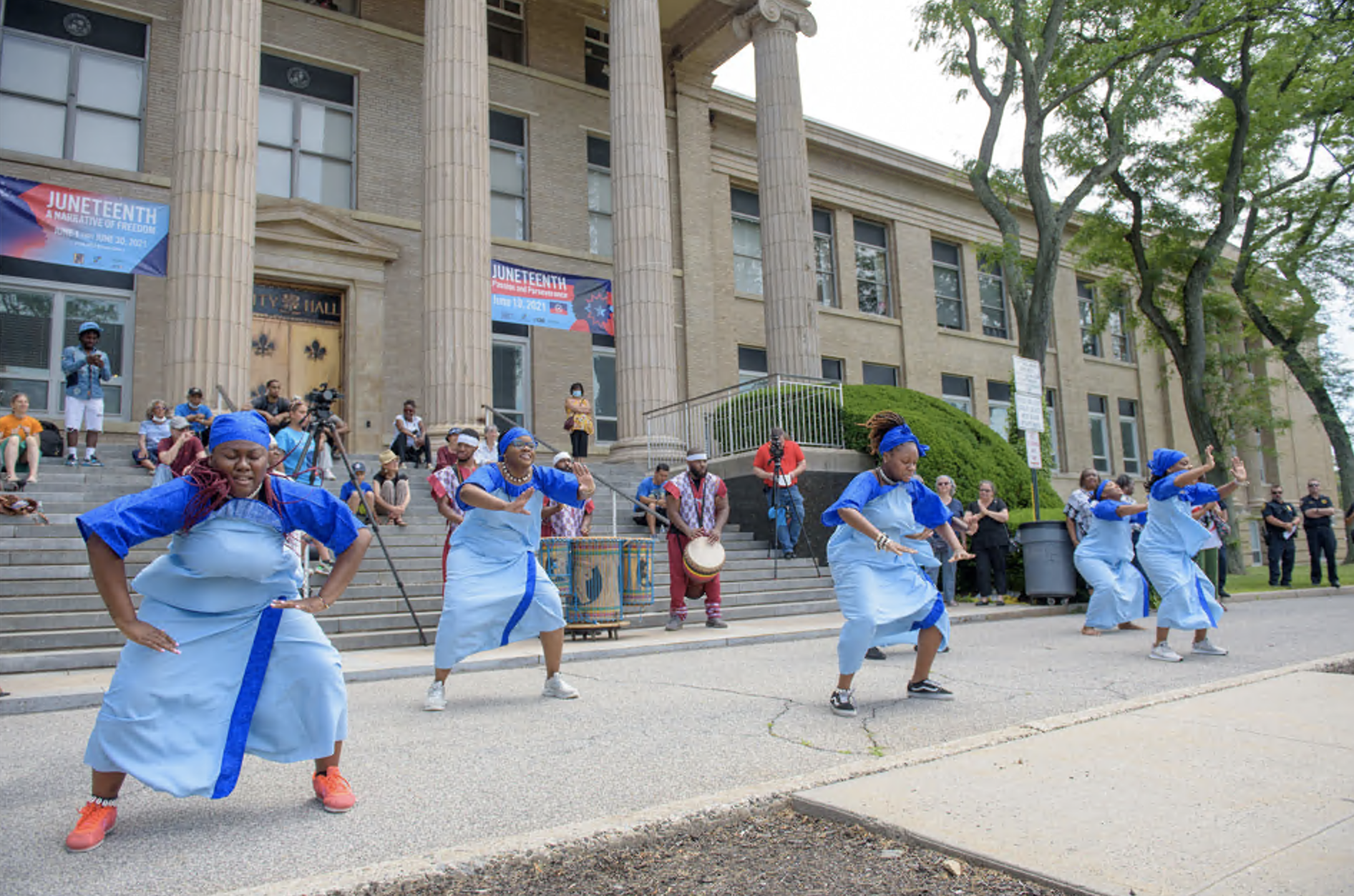Celebrating Juneteenth

Juneteenth, also known as Freedom Day, Jubilee Day and Liberation Day, is the oldest known celebration that commemorates the ending of slavery in the United States. This month, Westchester and Rockland Counties come together to celebrate this momentous holiday and kick off a month-long series of Juneteenth activities.
The following pages feature excerpts from interviews between with prominent Juneteenth community leaders in Westchester County conducted by ArtsWestchester’s Director of Folk Arts Aaron Paige, and Public Programs Associate Niara Jordan. Like the interviews featured in last year’s issue, these talks highlight how each of these groups will celebrate Juneteenth and what the holiday means to them. The pages following these interviews feature a calendar of Juneteearnth events in Westchester and Rockland. For more Juneteenth events throughout the month, click here.
Ardsley
Interview with Dana Laurient, Chair of the Ardsley Multicultural, Diversity and Inclusion Committee, conducted by Niara Jordan
Niara Jordan (NJ): What was the start of bringing your Juneteenth celebration to life?
Dana Laurient (DL): …One of our wonderful residents and students… along with some other students, organized the Juneteenth celebration. …The following year, our high school students led the charge again… This is our third annual Juneteenth coming up. Again we are engaging the residents, as well as the students. We have teachers, [and students] on our committee. Our mayor, Nancy Kaboolian, is a champion of all things diversity and inclusion.
This year we’re having a marching band, like an old-school homecoming. We’re having a night event for the first time (5-9pm at Pascone Park)… One thing that I love about this event is it that it brings the community together. Not just African Americans, but all cultures. This year, we’re featuring world-renowned DJ Casino…. We’re having food trucks, tents and an African drum circle. It’s going to be big. We’re allowing high schoolers to take a lead role with singing the national Black Anthem and presenting poetry… letting them create the artistic share of the program…
NJ: Did you know of any history of Juneteenth being celebrated in Ardsley?
DL: No. I was not aware of any other celebration of Juneteenth. But I will tell you this, the school district is really great at celebrating Juneteenth… We have a great superintendent and he allows the students to participate… We want to encourage our children to be leaders, to participate in their community but also on the global level to be able to speak to issues that affect us every day, that are part of history and American history…
NJ: Did you get to learn about Juneteenth growing up yourself?
DL: Honestly speaking, I didn’t learn about Juneteenth until I was a whole adult. I did not hear about it in school. I did not learn about it. Not even in my African American studies courses in college… I did not know just like I did not know about the Tulsa bombings… It is important that we educate ourselves and that we educate our children. All history is good history; we can decide whether we want to grow from it, whether we want to not repeat it. We are not going to repeat that history.
Click here for the full interview.
Bedford
Interview with Andromeda Turre, Chairperson of the Bedford IDEA Committee, conducted by Aaron Paige
Aaron Paige (AP): What is the origin story behind Bedford’s Juneteenth celebration?
Andromeda Turre (AT): Our committee decided to produce a Juneteenth celebration and what it triggered was a big research project, finding local African American history and the history of enslavement in the town of Bedford. We were able to find such a rich history…When I think of the enslaved, I think of people who really helped to build this town: working the lands…they were skilled workers… and they are a part of the history of this town too. I feel that Juneteenth is important…to honor their labor and to celebrate them.
AP: Can you tell me what’s next with your research?
AT: Next we are going to work with the Historical Society to interview more Black elders in our community and start to close the gap in the history…There is so much written on the history of white residents here. To be able to also offer a history of Black residents, I felt, was important and it’s spawned a whole big project in our town.
AP: What are your plans for Juneteenth 2022?
AT: Caramoor [has] been an incredible partner on this… As part of the art station, I wanted to dig into the history of quilting and how we used freedom symbols on quilts in connection to the Underground Railroad. Quilters from Antioch Baptist Church will be making an interactive quilt. Kids will be able to put pieces on it and write with fabric markers. We will also be including the names of those that were enslaved here into that quilt. In collaboration with the Katonah Museum of Art, we are also offering a paper craft based on those same freedom symbols. For the movement station, we will have double-dutch, because that’s a fun part of Black culture and we’ll be explaining a little of the history. There will also be a lady teaching step routines.
If you just want to come and listen to the stories and hear the music, we have Jeremiah Abiah – he’s an incredible songwriter and vocalist. There will be some powerful speakers interspersed throughout his performance. Also this year, because Juneteenth falls on Father’s Day, we will pair Caramoor’s sound art tours with a history of important Black men that were fathers in Westchester.
Click here for the full interview.
Greenburgh
Interview with Gina Jackson, Councilwoman for Town of Greenburgh, conducted by Niara Jordan
Niara Jordan (NJ): Tell us about how your Juneteenth celebration was brought to life.
Gina Jackson (GJ): …I took office two months before COVID hit in March 2020…That year, we had our first Juneteenth celebration in Greenburgh and we organized it as motorcade because everyone had to be in their separate vehicles and six feet apart…Last year… we enhanced the celebration and even added a flag raising at our Town Hall… We had a young woman come in and present a poem for us. We had music featuring a local DJ… This year, our third year, will be even bigger…
I want to be able to celebrate with my neighbors and to bring together everyone in the community… people who don’t look like me to come out and really learn about our history and learn about the history of Juneteenth.
…For me, I have nieces and nephews and am a mother of a 14-year-old son. I want them to understand what Juneteenth is and what exactly it stands for, because they may or may not learn it in school. We have to teach our youth…That is really my goal, to bring people together… I want to dispel stereotypes, rumors and negativity. At some point, hopefully, the message will be heard and we can just come together with no biases at all and just embrace one another. We have to work towards real inclusion, diversity and equity. It’s not window dressing. ..This is not a Black event. This is a historical event. This is an educational event for everyone to come out and learn about African American history. That’s what it means to be inclusive. That’s what it means to have diversity, to be willing to listen to one another and learn from one another.
NJ: Did you learn about Juneteenth when you were coming up?
GJ: I learned about Juneteenth from the late great William Carter. He was a leader of White Plains Juneteenth. He and I had many conversations—he was the one who really taught me about it. That’s why I make it a point that my son understands what Juneteenth is… Those like myself, who did not learn about Juneteenth in school, can learn about it from this type of event. And then they can begin to teach their communities, or their households, or anyone.
Click here for the full interview.
Dobbs Ferry
Interview with Kerlyne Colin, Director of Equity and Special Projects at The Children’s Village, conducted by Niara Jordan
Niara Jordan (NJ): What was the start of bringing your celebration to life?
Kerlyne Colin (KC): The kids on our Children’s Village are in a residential treatment facility and live with us here in Dobbs Ferry. They don’t get the same opportunities as other people… [so] he thought about bringing [Juneteenth] right here to their campus so that they are able to indulge. This year will be our third annual Juneteenth celebration. We care for them on our campus, so we thought “Why not have it right here in their home? Why must they always travel somewhere else for them to get those kinds of experiences?”
NJ: How do the arts play into your celebration?
KC: [We did] some African beading… and arts and crafts, where they got to express themselves – draw [in response to prompts like] “What does Juneteenth mean?”…Young people did poems; they were able to verbally express their art. Some created raps and songs. It was a very beautiful experience… It’s important every day, but especially on a day like Juneteenth, to ensure that they feel empowered, uplifted and heard…
NJ: What’s unique about your program to you?
KC: I think what makes our celebration unique is being able to watch our young people go through the journey: coming in not having the information about Juneteenth… then learning about it… and watching them celebrate it… For Juneteenth, we try to have a speaker… [to] share inspirational words for our young people… And of course, we always have to have good food… A majority of our kids are Black and Brown, and this is a Black holiday celebrating Black freedom…That makes it all the more beautiful for them to be a part of: they get a chance to take that stage and honor our ancestors, be their ancestors’ wildest dreams…
NJ: What are your Juneteenth plans for this year?
KC: This year we’re celebrating the week before Juneteenth here… We’re going to have a speaker… We’ll do the same arts and crafts: painting, drawing and beading; everything with purpose. [We’ll] have some…music, some dancing. We’ll have some really good eats. We’re definitely trying to do it big. We’re going to keep it open to the community. But my focal point is always these young people…
Click here for the full interview.
Mamaroneck
Interview with Mamaroneck Community Leaders Leilani Yizar-Reid and Larry Albert, conducted by Niara Jordan
NJ: What would you say is unique about your program? Why and how is this an important celebration?
Leilani Yizar-Reid (LYR): … We want it to be a big deal because there was slavery and we do have records of enslaved Africans that were in the villages of Larchmont and Mamaroneck. We want to honor them, their journeys and to honor ourselves and our community. This year, our theme is “ancestral spiritual awakening.” I like to talk about the universe: “What is going on, universally? What is happening within us and within our community?” We’re starting to awaken, to connect not just with ourselves, but with our ancestors. To me, that is an awakening – a spiritual connection that we are starting to have and really honor. As part of the celebration, we will talk about the five pillars; food, faith, entertainment, family and education.
Larry Albert (LA): Our celebration speaks to the Black community, the contributions, the legacy that we’ve had here for many years – how we came here, how we landed here, the food…
NJ: What activities are you are planning?
LA: There are going to be drummers and a DJ. We’re going to do some narratives on some of the issues that affect our culture, and how our culture has contributed to this community.
LYR: … It will be fun, but there are also going to be educational moments where we are teaching. We will talk about music and how music has shaped us as a people…When it comes to food, we’re going to have a cooking demonstration for kids and adults. They’ll learn about rice and beans and how these foods were transformed or translated from Africa, to the Caribbean, to this country. How their preparation has changed over time, as we’ve shifted and intertwined with other cultures…
NJ: What does Juneteenth mean to you?
LYR: Juneteenth means if one is not free, then we all are not free.
LA: For me, it’s a time to look at the history of this country and look at how slavery has affected this country until today, with the systemic racism that still exists. We have to acknowledge this, learn from this, and then we can move on. We made some improvements. But there is a lot more work to be done— knowing our history and knowing where we have to go.
Click here for the full interview.
New Rochelle
Interview with Linda Tarrant-Reid, Executive Director of the Lincoln Park Conservancy, conducted by Aaron Paige
Aaron Paige (AP): How did Juneteenth in New Rochelle first come together?
Linda Tarrant-Reid (LTR): Last year, we went to the City of New Rochelle to ask them [to partner on a] Juneteenth celebration…We wanted it to be multi-venue, multi-organizational. We wanted the message and the information about the history of Juneteenth to permeate the community. We did not want it to be only for the African American community. It was for the entire community…We had to [go all out], because our goal was to make sure that it was a big splash, because it had never happened before in New Rochelle.
AP: What are your plans for Juneteenth in 2022?
LTR: Some of the organizations this year include the New Rochelle Public Library…NAACP…The Inter Religious Council of New Rochelle, which put together a group of religious leaders… New Rochelle Council on the Arts… This year we also have a group called Urban Legacy.
We’ve gone from one day in three locations to June 16-20 in six locations. We have the New Rochelle United Methodist Church, Thomas Paine Cottage Museum and Paine Memorial building again. The Church will be screening [the documentary] Leveling Lincoln…We’re also going to have a Black Wealth Expo at Lincoln Park, and …an outdoor screening of Leveling Lincoln there as well.
On Monday, a trolley will tour Black enclaves in the City of New Rochelle. At City Hall on June 19, we’re going to have a program that runs 12-5pm… We’re also going to have an African Village Marketplace and a jazz concert. The NAACP is going to do a presentation by a historian. At the Bracey Apartments, where a lot of our lower income families and seniors live, [we’ll have] a gospel extravaganza.
AP: What does Juneteenth means to you personally?
LTR: …It puts me in a place of comfort and stability to know about my history, no matter how painful it is. And it is painful. The fact that we endured. The fact that we built this country… All of this we need to be teaching to our Black students and to Black people in general, so that they can understand the incredible legacy that we come from.
Click here for the full interview.
Ossining
Interview with Joyce Sharrock-Cole, Ossining Village Historian, conducted by Aaron Paige
Aaron Paige (AP): How did the Ossining Juneteenth begin?
Joyce Sharrock-Cole (JSC): It was birthed in 2020 after the murder of George Floyd and subsequent civil unrest in the country…Our first order of business was to organize the first community celebration of Juneteenth in the middle of an ongoing global pandemic. It was no small feat… We also decided that since this was our first community celebration we should mimic the first Juneteenth celebration in 1866. It was important for us to educate the community on the significance of the day…Everyone loves a great celebration; however, we need to understand why we are celebrating…
AP: As the Village Historian, are you exploring the history of Ossining’s African American community in your Juneteenth celebration?
JSC: Yes, I accomplish this in different ways and throughout the year… On Juneteenth we will be highlighting and celebrating those that came before us and paved the way, and those today that are fighting for us to go forward. I will never stop telling their story until it is part of the bigger story. As historian, I am trying to normalize hearing the history of the forgotten and marginalized.
AP: What are your Juneteenth plans for this coming year?
JSC: Each year, we add more to the celebration as the support grows. We are excited this year to have Neeks Catering back to serve our community traditional African foods…We want to immerse ourselves in the culture, whether food, drumming and learning the history… As in the past two years, we are celebrating talent in our community. Our DJ, emcee, spoken word artist, praise dancers, poets and more are all from Ossining. We also have a nice selection of vendors from the community… Steven Dillard, who was in the rap group ILL-Responsible, and is a community activist and line dance instructor, will serve as emcee. Our DJ will be Spencer Thomas “DJ Spinny Spin.” The Ossining Branch of the NAACP Youth Group will also host a fashion show on June 17 at Bethany Arts Community …
The celebration will take place at Louis Engel Waterfront Park in Ossining. There’s a gorgeous waterfront; however, there is historic significance for this venue. After emancipation, Black people were not allowed to congregate in public areas, so they would go down by the waterfront to have their events and commune with each other.
Click here for the full interview.
Pelham
Excerpts from an interview with Jeff Watkins and Emlyn Taveras, conducted by Niara Jordan
Niara Jordan (NJ): What was the start of bringing your Juneteenth celebration to life last year?
Jeff Watkins (JW): We set the vision forth…— that the village would have its first Juneteenth celebration, especially off the back of several weeks of protests, vigils and rallies after the George Floyd murder.
Emlyn Taveras (ET): …It was our priority to kick off with this real celebration of freedom and public art. This powerful event was about coming together in support of all humanities, and doing it through education, through arts, through organizing and having a good time together….
NJ: What do you feel was unique about last year’s program?
ET: I think what was important for us was to make sure that we engaged the young people in the dialogue of creating this event and making something that was really focused on the arts, Black culture, and a celebration prioritizing dialogue of these things.
JW: What made it unique was the art. It spread across so many different mediums of communication and expression. We had films going on with the Picture House, interactive art with artists, music, dance, spoken word and speech… a sculpture dedicated in the park. All these different mediums happening all in the same event.
NJ: Are there any Juneteenth plans for this year and if so, what are they?
JW: We’r going to incorporate pretty much everything we had last year…but more. More performers, more artists from a wider range. We’ll also be supporting Black businesses with vendors and food trucks. We’re going to block off the streets to have a marketplace. It’s just bigger and better.
NJ: And what does Juneteenth mean to you all personally?
JW: For me, it’s a celebration of overcoming. A celebration of achievement… I think it was a pivotal moment for me that celebrates that Black people and all People of Color can overcome anything…But the oppressor, they couldn’t hold us down to not be free. It’s motivational in that way, so we’re going to celebrate it…
ET: It’s a big question because it means so many things, and it’s continuing to grow with things that we’re witnessing every single day in our own communities. The idea of what freedom looks like today and what it looked like before is ever evolving for our kids and ourselves.
Click here for the full interview.
A version of this article first appeared in the June 2022 issue of ArtsNews, ArtsWestchester’s monthly publication. ArtsNews is distributed throughout Westchester County. A digital copy is also available at artsw.org/artsnews.

About ArtsWestchester
For more than 50 years, ArtsWestchester has been the community’s connection to the arts. Founded in 1965, it is the largest, private, not-for-profit arts council in New York State. Its mission is to provide leadership, vision, and support, to ensure the availability, accessibility, and diversity of the arts. ArtsWestchester provides programs and services that enrich the lives of everyone in Westchester County. ArtsWestchester helps fund concerts, exhibitions and plays through grants; brings artists into schools and community centers; advocates for the arts; and builds audiences through diverse marketing initiatives. In 1998, ArtsWestchester purchased the nine-story neo-classical bank building at 31 Mamaroneck Avenue which has since been transformed into a multi-use resource for artists, cultural organizations, and the community. A two-story gallery is located on the first floor of ArtsWestchester’s historic building on Mamaroneck Avenue.
For more than 50 years, ArtsWestchester has been the community’s connection to the arts. Founded in 1965, it is the largest, private, not-for-profit arts council in New York State. Its mission is to provide leadership, vision, and support, to ensure the availability, accessibility, and diversity of the arts. ArtsWestchester provides programs and services that enrich the lives of everyone in Westchester County. ArtsWestchester helps fund concerts, exhibitions and plays through grants; brings artists into schools and community centers; advocates for the arts; and builds audiences through diverse marketing initiatives. In 1998, ArtsWestchester purchased the nine-story neo-classical bank building at 31 Mamaroneck Avenue which has since been transformed into a multi-use resource for artists, cultural organizations, and the community. A two-story gallery is located on the first floor of ArtsWestchester’s historic building on Mamaroneck Avenue.

